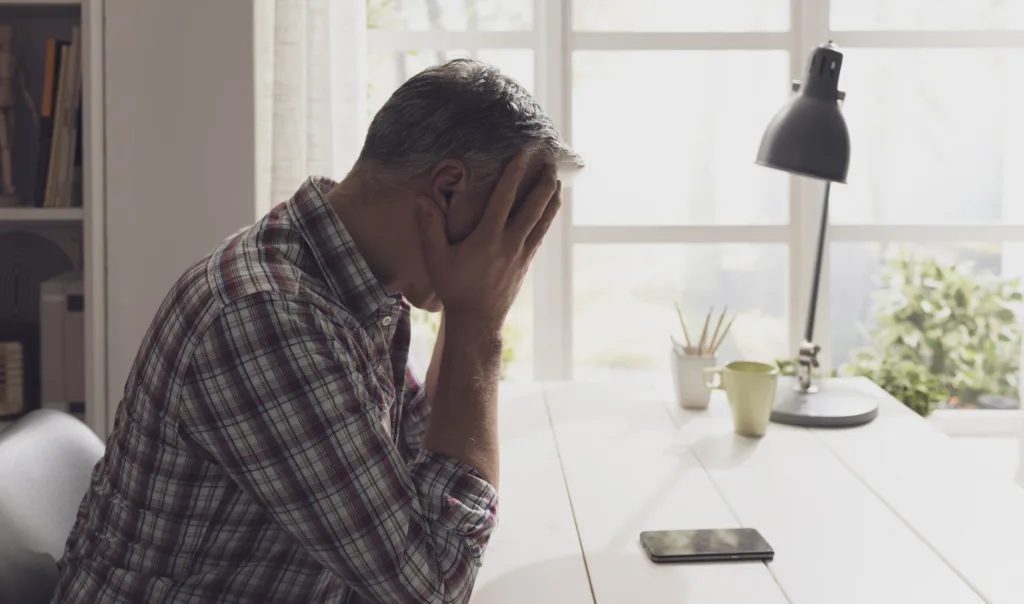Anxiety and PTSD: Are They the Same Thing?

Anxiety disorders and post-traumatic stress disorder (PTSD) can produce similar symptoms in people, sometimes making them difficult to distinguish.
Anxiety and PTSD can overlap in an individual, but they remain distinct conditions. A person struggling with anxiety doesn’t necessarily have PTSD; a person with PTSD, however, is likely also suffering from stress at the same time.
These conditions can manifest symptoms that are relatively mild at first, leading many people to ignore or not even recognize the presence of the disease. The longer it goes unaddressed, the more exacerbated the symptoms become and the more significant toll it takes on our lives.
Learning the difference between anxiety and PTSD is the first step to gaining some insights into what kind of treatment will be right for you in the short- and long-term.
In this article, we will take a closer look at anxiety and PTSD, identify whether or not these two disorders are the same, and help you recognize each one’s symptoms.
What is anxiety?
Anxiety is the lingering sense of unease, dread, fear, apprehension, trepidation.
In normal circumstances, anxiety is the body’s response to a perceived threat, danger or elevated stress levels. In these situations, anxiety can actually be helpful and sometimes even life-saving.
An anxiety disorder, however, refers to the ongoing presence of anxiety symptoms regardless of whether or not you’re actively in a situation that generally calls for an anxious response.
Pay attention if you’re sitting at home watching a movie with your family on a Friday night but still feel on edge and overwhelmed with worry (for no particular reason).
Anxiety is not who you are or a personality trait; it’s a symptom of a more significant issue.
What is PTSD?
Post-traumatic stress disorder (PTSD) is a mental health condition commonly developed after a person witnesses or experiences a traumatic event.
Though PTSD is often associated with those who have served in military combat or experienced extreme violence, it can affect men and women (and children) of all backgrounds and lifestyles.
Other traumatic events that can lead to PTSD include:
- Physical or sexual assault
- Experiencing a natural disaster
- Serious accidents (like car crashes)
- Childhood abuse or neglect
- Terrorism
Early intervention is essential for individuals struggling with PTSD, as the condition can escalate to the level of posing a danger to oneself or others when left untreated.
Is PTSD an anxiety disorder?
PTSD was once considered an anxiety disorder but has been officially categorized as a mental health condition. It can co-exist with anxiety or an anxiety disorder in a person, though.
Anxiety is not inherently triggered by trauma. An anxiety disorder producing chronic anxiety symptoms is not necessarily linked to trauma. Those disorders can develop due to various factors, including relationships, the state of your mental health, and your home, work and school environment.
PTSD is triggered explicitly by exposure to a traumatic event, whether directly experiencing or witnessing it. Though not all traumatic events are life-threatening, none are minor and most take a severe toll on a person’s health and well-being.
Though PTSD Is not exclusively an anxiety disorder, it can co-exist with anxiety or an anxiety disorder in an individual and frequently does. Due to the nature of PTSD and how it affects a person’s mental and emotional health, anxiety symptoms commonly manifest with it.
Anxiety and PTSD symptoms
Many symptoms of anxiety and PTSD overlap, such as excessive worry, frequent or irrational fears, negative thinking patterns, avoidance behaviors and difficulty sleeping.
PTSD does have additional symptoms due to the often more extreme circumstances of the situations that led to the development of the disorder.
Some of these other symptoms include:
- Feelings of detachment from others (or emotional numbness)
- Intrusive thoughts, flashbacks or nightmares
- Patterns of self-harming
- Paranoia and other forms of hypervigilance
- The development of aggressive or violent behaviors
It’s important to remember that anxiety and PTSD can affect people differently and to varying degrees of severity. Symptoms that manifest mildly in one person may not display at all in another and maybe even more extreme in someone else.
Whatever your symptoms, if they’ve begun interfering with your daily life, contact us.
Start healing today
Pyramid Healthcare is a premier behavioral healthcare provider helping you achieve optimal mental, behavioral and overall health. We’re committed to working with you from day one to identify your needs and help you improve your health and well-being.
Understanding that each person benefits from a unique treatment plan, we offer various effective, personalized services for the complete healing and restoration of your health.
Call us today to speak with one of our intake specialists and identify what type of services and level of support is best suited to meet your needs.
Anxiety disorders and post-traumatic stress disorder (PTSD) can produce similar symptoms in people, sometimes making them difficult to distinguish.
Anxiety and PTSD can overlap in an individual, but they remain distinct conditions. A person struggling with anxiety doesn’t necessarily have PTSD; a person with PTSD, however, is likely also suffering from stress at the same time.
These conditions can manifest symptoms that are relatively mild at first, leading many people to ignore or not even recognize the presence of the disease. The longer it goes unaddressed, the more exacerbated the symptoms become and the more significant toll it takes on our lives.
Learning the difference between anxiety and PTSD is the first step to gaining some insights into what kind of treatment will be right for you in the short- and long-term.
In this article, we will take a closer look at anxiety and PTSD, identify whether or not these two disorders are the same, and help you recognize each one’s symptoms.
What is anxiety?
Anxiety is the lingering sense of unease, dread, fear, apprehension, trepidation.
In normal circumstances, anxiety is the body’s response to a perceived threat, danger or elevated stress levels. In these situations, anxiety can actually be helpful and sometimes even life-saving.
An anxiety disorder, however, refers to the ongoing presence of anxiety symptoms regardless of whether or not you’re actively in a situation that generally calls for an anxious response.
Pay attention if you’re sitting at home watching a movie with your family on a Friday night but still feel on edge and overwhelmed with worry (for no particular reason).
Anxiety is not who you are or a personality trait; it’s a symptom of a more significant issue.
What is PTSD?
Post-traumatic stress disorder (PTSD) is a mental health condition commonly developed after a person witnesses or experiences a traumatic event.
Though PTSD is often associated with those who have served in military combat or experienced extreme violence, it can affect men and women (and children) of all backgrounds and lifestyles.
Other traumatic events that can lead to PTSD include:
- Physical or sexual assault
- Experiencing a natural disaster
- Serious accidents (like car crashes)
- Childhood abuse or neglect
- Terrorism
Early intervention is essential for individuals struggling with PTSD, as the condition can escalate to the level of posing a danger to oneself or others when left untreated.
Is PTSD an anxiety disorder?
PTSD was once considered an anxiety disorder but has been officially categorized as a mental health condition. It can co-exist with anxiety or an anxiety disorder in a person, though.
Anxiety is not inherently triggered by trauma. An anxiety disorder producing chronic anxiety symptoms is not necessarily linked to trauma. Those disorders can develop due to various factors, including relationships, the state of your mental health, and your home, work and school environment.
PTSD is triggered explicitly by exposure to a traumatic event, whether directly experiencing or witnessing it. Though not all traumatic events are life-threatening, none are minor and most take a severe toll on a person’s health and well-being.
Though PTSD Is not exclusively an anxiety disorder, it can co-exist with anxiety or an anxiety disorder in an individual and frequently does. Due to the nature of PTSD and how it affects a person’s mental and emotional health, anxiety symptoms commonly manifest with it.
Anxiety and PTSD symptoms
Many symptoms of anxiety and PTSD overlap, such as excessive worry, frequent or irrational fears, negative thinking patterns, avoidance behaviors and difficulty sleeping.
PTSD does have additional symptoms due to the often more extreme circumstances of the situations that led to the development of the disorder.
Some of these other symptoms include:
- Feelings of detachment from others (or emotional numbness)
- Intrusive thoughts, flashbacks or nightmares
- Patterns of self-harming
- Paranoia and other forms of hypervigilance
- The development of aggressive or violent behaviors
It’s important to remember that anxiety and PTSD can affect people differently and to varying degrees of severity. Symptoms that manifest mildly in one person may not display at all in another and maybe even more extreme in someone else.
Whatever your symptoms, if they’ve begun interfering with your daily life, contact us.
Start healing today
Pyramid Healthcare is a premier behavioral healthcare provider helping you achieve optimal mental, behavioral and overall health. We’re committed to working with you from day one to identify your needs and help you improve your health and well-being.
Understanding that each person benefits from a unique treatment plan, we offer various effective, personalized services for the complete healing and restoration of your health.
Call us today to speak with one of our intake specialists and identify what type of services and level of support is best suited to meet your needs.







